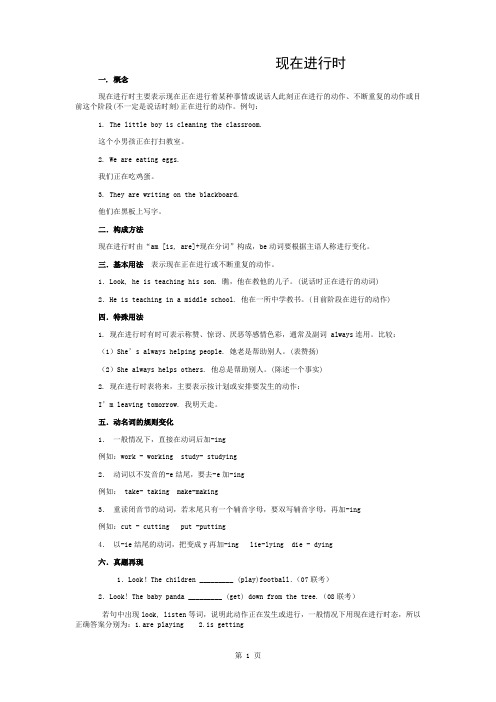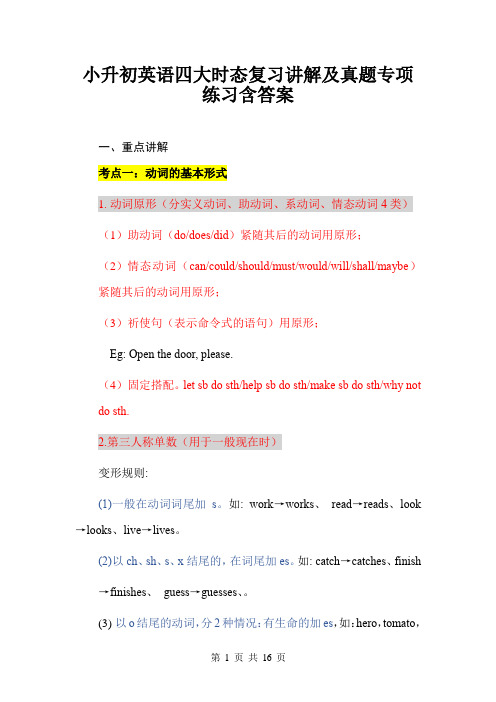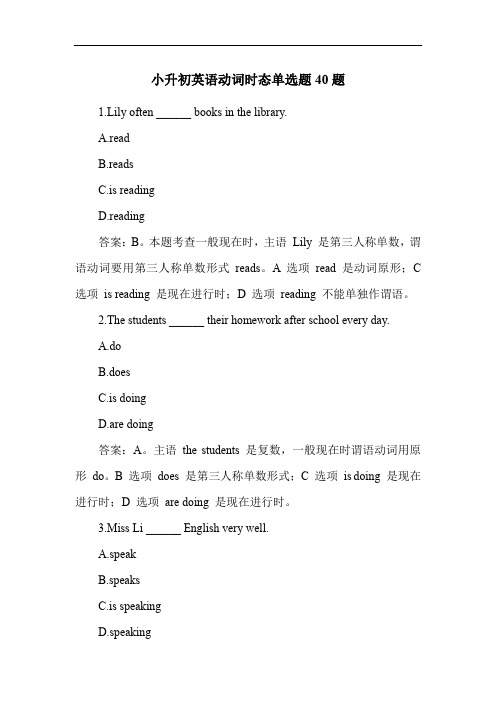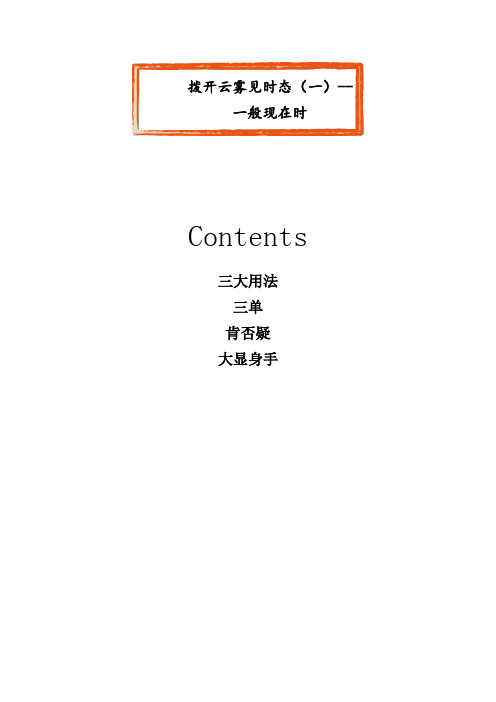小升初动词时态练习及答案
小升初英语时态专项复习及答案(教案)

现在进行时一. 概念现在进行时主要表示现在正在进行着某种事情或说话人此刻正在进行的动作、不断重复的动作或目前这个阶段(不一定是说话时刻)正在进行的动作。
例句:1. The little boy is cleaning the classroom.这个小男孩正在打扫教室。
2. We are eating eggs.我们正在吃鸡蛋。
3. They are writing on the blackboard.他们在黑板上写字。
二.构成方法现在进行时由“am [is, are]+现在分词”构成,be动词要根据主语人称进行变化。
三.基本用法表示现在正在进行或不断重复的动作。
1.Look, he is teaching his son. 瞧,他在教他的儿子。
(说话时正在进行的动词)2.He is teaching in a middle school. 他在一所中学教书。
(目前阶段在进行的动作)四.特殊用法1. 现在进行时有时可表示称赞、惊讶、厌恶等感情色彩,通常及副词 always连用。
比较:(1)She’s always helping people. 她老是帮助别人。
(表赞扬)(2)She always helps others. 他总是帮助别人。
(陈述一个事实)2. 现在进行时表将来,主要表示按计划或安排要发生的动作:I’m leaving tomorrow. 我明天走。
五.动名词的规则变化1.一般情况下,直接在动词后加-ing例如:work - working study- studying2.动词以不发音的-e结尾,要去-e加-ing例如: take- taking make-making3.重读闭音节的动词,若末尾只有一个辅音字母,要双写辅音字母,再加-ing例如:cut - cutting put -putting4.以-ie结尾的动词,把变成y再加-ing lie-lying die - dying六.真题再现1.Look!The children _________ (play)football.(07联考)2.Look! The baby panda _________ (get) down from the tree.(08联考)若句中出现look, listen等词,说明此动作正在发生或进行,一般情况下用现在进行时态,所以正确答案分别为:1.are playing 2.is getting3.---Who are you _________, Andy ---Mum. (10联考)A. waitB. waitingC. waiting forD. wait for根据现在进行时的构成可排除A和 D选项,本题考查wait for+等候的对象这一用法,故选C.精点精练一、用动词的正确形式填空。
小升初英语四大时态复习讲解及真题专项练习含答案

小升初英语四大时态复习讲解及真题专项练习含答案一、重点讲解考点一:动词的基本形式1.动词原形(分实义动词、助动词、系动词、情态动词4类)(1)助动词(do/does/did)紧随其后的动词用原形;(2)情态动词(can/could/should/must/would/will/shall/maybe)紧随其后的动词用原形;(3)祈使句(表示命令式的语句)用原形;Eg: Open the door, please.(4)固定搭配。
let sb do sth/help sb do sth/make sb do sth/why not do sth.2.第三人称单数(用于一般现在时)变形规则:(1)一般在动词词尾加s。
如: work→works、read→reads、look →looks、live→lives。
(2)以ch、sh、s、x结尾的,在词尾加es。
如: catch→catches、finish→finishes、guess→guesses、。
(3)以o结尾的动词,分2种情况:有生命的加es,如:hero,tomato,potato;没有生命的加s,如:radio,photo。
(4)以辅音字母加y结尾的动词,变y为ies。
如: fly→flies、study →studies、carry→carries.(5) 不规则变化。
如: have→has ,are→is,were→was3.现在分词(用于现在进行时)变形规则:(1)一般在动词后加ing。
如: work→working、read→reading、look →looking、wait→waiting。
(2)以不发音的e结尾的动词,去掉e,再加ing。
如: smile→smiling、move→moving、take→taking、write→writing。
(3)以重读闭音节结尾的且词尾只有一个辅音字母的,双写这个辅音字母加ing。
如: sit→sitting、stop→stopping、cut→cutting、run →running、swim→swimming.(4)少数几个以ie结尾的动词,将ie改为y加ing。
小升初语法动词的时态和语态专项练习题 (2)

小升初语法动词的时态和语态专项练习题参考答案与试题解析一.选择题(共15小题)1.Danny usually________the park on Sundays.()A.goes to B.is going toC.go to【分析】Danny通常在周日去公园。
【解答】考查一般现在时及动词的第三人称单数。
usualy用于一般现在时的句子中。
题干的主语是Danny,第三人称单数,谓语动词用第三人称单数形式。
go to the park去公园。
go的第三人称单数是goes。
故选:A。
【点评】考查一般现在时及动词的第三人称单数,要结合关键时间副词判定时态,结合句子主语,认真作答。
2.Guo Yang never computer games.()A.play B.plays C.played D.playing【分析】郭阳从来不玩电脑游戏。
【解答】考查一般现在时及动词的第三人称单数。
题干少谓语动词。
表达"从来不玩"是习惯性的动作,时态为一般现在时,句子主语是郭阳,第三人称单数,谓语动词用第三人称单数形式。
play是动词原形;plays是动词的第三人称单数;played是动词的过去式;playing是动词的现在分词。
故选:B。
【点评】考查一般现在时及动词的第三人称单数,要结合关键词判定时态,然后根据句子主语选择,注意保持主谓一致。
3.Look,Wang Hong ___in a chair.()A.sits B.sit C.is sitting【分析】看,王红正坐在椅子上。
【解答】考查现在进行时。
根据句中Look可知事情正在发生,Wang Hong 第三人称单数,谓语动词用is,sit的现在分词是sitting。
故选:C。
【点评】熟练掌握现在进行时的用法,灵活运用。
4.There are eleven pigs. They are _______ vegetables .()A.eat B.eating C.is eating【分析】有十一头猪。
小升初英语动词时态变化练习题50题(答案解析)

小升初英语动词时态变化练习题50题(答案解析)1.I ______ my homework every day.A.doB.doesC.doingD.done答案解析:A。
一般现在时中,主语是I,谓语动词用原形do。
B 选项does 用于主语是第三人称单数的时候;C 选项doing 是现在分词形式,不能单独作谓语;D 选项done 是过去分词形式,也不能单独作谓语。
2.She ______ to school by bus.A.goB.goesC.goingD.gone答案解析:B。
一般现在时中,主语是she,第三人称单数,谓语动词要用goes。
A 选项go 用于主语是I、you、we、they 等的时候;C 选项going 是现在分词形式,不能单独作谓语;D 选项gone 是过去分词形式,不能单独作谓语。
3.We ______ English on Monday.A.haveB.hasC.havingD.had答案解析:A。
一般现在时中,主语是we,谓语动词用原形have。
B 选项has 用于主语是第三人称单数的时候;C 选项having 是现在分词形式,不能单独作谓语;D 选项had 是过去式,用于一般过去时。
4.He ______ football after school.A.playB.playsC.playingD.played答案解析:B。
一般现在时中,主语是he,第三人称单数,谓语动词要用plays。
A 选项play 用于主语是I、you、we、they 等的时候;C 选项playing 是现在分词形式,不能单独作谓语;D 选项played 是过去式,用于一般过去时。
5.They ______ books in the library.A.readB.readsC.readingD.readed答案解析:A。
一般现在时中,主语是they,谓语动词用原形read。
B 选项reads 用于主语是第三人称单数的时候;C 选项reading 是现在分词形式,不能单独作谓语;D 选项readed 是错误形式,read 的过去式和过去分词都是read。
小升初英语动词时态单选题40题

小升初英语动词时态单选题40题1.Lily often ______ books in the library.A.readB.readsC.is readingD.reading答案:B。
本题考查一般现在时,主语Lily 是第三人称单数,谓语动词要用第三人称单数形式reads。
A 选项read 是动词原形;C 选项is reading 是现在进行时;D 选项reading 不能单独作谓语。
2.The students ______ their homework after school every day.A.doB.doesC.is doingD.are doing答案:A。
主语the students 是复数,一般现在时谓语动词用原形do。
B 选项does 是第三人称单数形式;C 选项is doing 是现在进行时;D 选项are doing 是现在进行时。
3.Miss Li ______ English very well.A.speakB.speaksC.is speakingD.speaking答案:B。
Miss Li 是第三人称单数,谓语动词用第三人称单数形式speaks。
A 选项speak 是动词原形;C 选项is speaking 是现在进行时;D 选项speaking 不能单独作谓语。
4.We ______ music class on Tuesday.A.haveB.hasC.is havingD.are having答案:A。
主语we 是复数,一般现在时谓语动词用原形have。
B 选项has 是第三人称单数形式;C 选项is having 和D 选项are having 都是现在进行时。
5.The bell ______ at eight o'clock every morning.A.ringB.ringsC.is ringingD.are ringing答案:B。
小升初英语动词时态变化练习题50题带答案

小升初英语动词时态变化练习题50题带答案1.I _____ to school every day.A.goB.goesC.wentD.going答案解析:A。
本题考查一般现在时。
选项A“go”是动词原形,用于一般现在时主语是第一人称、第二人称和第三人称复数的情况。
句子中的主语是“I”,所以用“go”。
选项B“goes”是动词第三人称单数形式,用于主语是第三人称单数时。
选项C“went”是过去式,不符合本题时态。
选项D“going”不能单独作谓语。
一般现在时表示经常发生的动作或存在的状态,标志词有often、usually、always 等。
2.She _____ breakfast at seven.A.haveB.hasC.hadD.having答案解析:B。
本题考查一般现在时第三人称单数形式。
选项B“has”是动词“have”的第三人称单数形式,句子主语“She”是第三人称单数,所以用“has”。
选项A“have”用于第一人称、第二人称和第三人称复数。
选项C“had”是过去式。
选项D“having”不能单独作谓语。
一般现在时表示经常发生的动作或存在的状态,标志词有often、usually、always 等。
3.We _____ our homework in the evening.A.doB.doesC.didD.doing答案解析:A。
本题考查一般现在时。
选项A“do”是动词原形,用于一般现在时主语是第一人称、第二人称和第三人称复数的情况。
句子中的主语是“We”,所以用“do”。
选项B“does”是动词第三人称单数形式。
选项C“did”是过去式。
选项D“doing”不能单独作谓语。
一般现在时表示经常发生的动作或存在的状态,标志词有often、usually、always 等。
4.He _____ football on Sundays.A.playB.playsC.playedD.playing答案解析:B。
小升初英语专项复习讲与练- 时态 通用版(word版,含答案)

拨开云雾见时态(一)--一般现在时Contents三大用法三单肯否疑大显身手一般现在时三大用法规律性的动作 Xiao Fan has three bowls of rice for dinner on Fridays.Da Qiang sleeps with the duck every day.现在的状态 I am a teacher.You are a student.He is a policeman.There is a snake.真理 The sun is bigger than the earth.The earth travels around the sun.三单动词第三人称单数变化规则一般:加s二般:以s、x、ch、sh、o结尾,加es三般:以辅y结尾,变y为i加es四特:have→has三单使用条件不是我,不是你,并且只有一个肯定句、否定句、疑问句I am a teacher. He is 30 years old. We are clever.I am not a dancer. He is not 13 years old. We are not stupid. Are you a teacher? Is he 30 years old? Are you clever?I eat 2 eggs every day.I don’t eat 2 eggs every day.Do you eat 2 eggs every day?She eats 20 eggs a week.She doesn’t eat 20 eggs a week.Does she eat 20 eggs a week?大显身手1.We often ___________ (play) in the playground.2.He _________ (get) up at six o’clock.3.Danny (study) English, Chinese, Maths, Science and Art at school. 4.She often __________ (watch) TV with her dog.5.__________ you_________ (brush) your teeth every morning?6.What (do) he usually (do) after school?1.I have many books. (改为否定句)__________________________________________2.Da Shan’s sister likes playing table tennis. (改为否定句)__________________________________________3.I watch TV every day. (改为一般疑问句)__________________________________________4.Yu Paopao is the cleverest student in her class. (改为否定句)__________________________________________Keys:1.play 2.gets 3.studies 4.watches 5.Do, brush 6.does, do 1.I don’t have many books.2.Da Shan’s sister doesn’t like playing table tennis.3.Do you watch TV every day?4.Yu Paopao is not the cleverest student in her class.测试题一、写出下列动词的第三人称单数形式get ________________ sit ________________come ________________ drive _________________fly _________________ study _________________wash _________________ watch _________________go ________________ do _________________二、单项选择1.Where _________ he _________ from?A.is, come B.do, comeC.does, come D.are, from2.We _____________ any Chinese cla sses on Friday.A.don’t has B.doesn’t haveC.don’t have D.are have3.Wang Mei __________ music and often ___________ to music.A.like; listen B.likes; listensC.like; are listening D.liking; listen4.Jenny ____________ in an office. Her parents ____________in a hospital.A.work ; works B.works ; workC.work ; are working D.is working ; work三、句型变化1.Tony watches TV every evening. (改为否定句)_________________________________________.2.Amy likes playing computer games. (改为一般疑问句) _________________________________________?3.Sun Yang washes clothes on Saturday.否定句: __________________________________一般疑问句: ______________________________肯定/ 否定回答 __________________ / __________________Keys:一、gets si ts comes drives fliesstudies washes watches go es does二、CCBB三、1. Tony doesn’t watch TV every evening.2. Does Amy like playing computer games?3. Sun Yang doesn’t wash clothes on Saturday.Does Sun Yang wash clothes on Saturday?Yes, he does. / No, he doesn’t.拨开云雾见时态㈡-- 一般过去时Contents肯否疑动词过去式大显身手一般过去时描述过去发生的事肯定句、否定句、疑问句I was in a quiet street.I was not in a quiet street.Was I in a quiet street? (Were you in a quiet street?)I had a dream last night.I didn’t have a dream last night.Did I have a dream last night? (Did you have a dream last night?) 动词过去式变化规则动词过去式,ed来结尾一般直接加,见e只加d辅y结尾y变i,再加ed重读辅元辅,双写尾字母常见不规则动词过去式大全am, is→wasare→werecut→cuthit→hitlet→letput→putcost→costhurt→hurtread→readfeel→feltmeet→metsmell→smeltfi nd→foundget→gothave→hadhold→heldmake→madesell→soldtell→toldcome→came become→becamerun→ranlearn→learned/learnt hear→heardwin→woncatch→caught teach→taughtbring→broughtbuy→boughtthink→thoughtfly→flewthrow→threwgrow→g rewknow→kneweat→atefall→fellgive→gavetake→tooksee→sawwrite→wroteride→rodedrive→drovebuild→builtlend→lentsend→sentspend→spentlose→lostpay→paidsay→saiddraw→drewshow→showed speak→spokebreak→brokesteal→stolewake→woke choose→ch ose forget→forgotsleep→sleptsweep→sweptstand→stoodunderstand→understoodbegin→beganring→rangsing→sangswim→swamdrink→drankdo→didgo→wentsit→sat时间标志词yesterday …ago last… the day before yesterday just now this morning i n 2008大显身手1.There _________ (be) no one here a moment ago.2.Helen and Nancy _________ (be) good friends, but now they are not. 3.I listened b ut ___________ (hear) nothing.1.How is Jane yesterday? ________2.He go to school by bus last week. ________3.I can fly kites seven years ago. ________4.Did you saw him j ust now. ________5.Tom wasn't watch TV last night. ________6.I did not my homework yesterday. ________Keys:1.was 2.were 3.heard 1.is→was2.go→went3.can→could4.saw→see . →?5.wasn’t→didn’t6.did not后面加do测试题一、写出下列动词的第三人称单数形式、过去式形式go_______ _______ enjoy_______ _______buy_______ _______ like_______ _______get _______ _______ walk_______ _______take_______ _______ dance_______ _______ write_______ _______ run_______ _______swim_______ _______ find_______ _______begin_______ _______ eat_______ _______play_______ _______ study_______ _______ 二、单项选择1.I ______________ my room last Sunday.A.cleaned B.clean C.am cleaning D.cleans2.What ______________ Mike do last weekend?A.do B.does C.is D.did3.______________ you ______________ TV last night.A.Do, watch B.Did, watch C.Did, watched D.Does, watches 4._____________ he ____________ football two days ago?A.Does, play B.Did, played C.Did, play D.Does, playing 5.They _______________ on a trip in February, 2007.A.are going B.going C.went D.goes6.She watered the flowers _______________.A.tomorrow B.sometimesC.yesterday morning D.every morning7.Mike_____________ a big tiger in the nature park last year.A.saw B.see C.seeing D.seen8.------ Good afternoon, Miss Lee. How does Mike feel?------ He’s tired. H e ____________ a lot of work ______________ .A.does, this morning B.do, this morningC.did, this morning D.have, this morning三、找出以下短文中的动词过去式,并将其对应的动词原形写出来The City Mouse and the Country MouseOnce there were two mice. They were friends. One mouse lived in the country; the other mouse lived in the city. After many years the Country mouse saw the City mouse; he said, "Do come and see me at my house in the country." So the City mouse went. The City mouse said, "This food is not good, and your house is not good. Why do you live in a hole in the field? You should come and live in the city. You would live in a nice house made of stone. You would have nice food to eat. You must come and see me at my house in the city."The Country mouse w ent to the house of the City mouse. It was a very good house. Nice food was set ready for them to eat. But just as they began to eat they heard a great noise. The City mouse cried, " Run! Run! The ca t is coming!" They ran away quickly and hid.After some time they came out. When they came out, the Country mouse said, "I do not like living in the city. I like living in my hole in th e field. For it is nicer to be poor and happy, than to be rich and afraid."Keys:goes went enjoys enjoyed buys bought eats ategets got walks walked takes took dances danced writes wrote runs ran swims swam finds found begins began likes likedp lays played studies studied ADBC CCACwere arelived livesaw see拨开云雾见时态㈢-- 一般将来时Contents肯否疑will、be going to大显身手一般将来时描述将来发生的事肯定句、否定句、疑问句Tigers will be a kind of vehicle.Tigers will not be a kind of vehicle. (will not=won’t)Will tigers be a kind of vehicle?Cars will run everywhere.Cars won’t run everywhere.Will cars run everywhere?时间标志词tomorrow soon from now on in the future next+ in+be going to两大用法1 打算做某事I’m going to be a si nger.She is going to learn French.2 根据现象作出推断It’s going to rain.She is going to faint. (她要晕了。
小升初英语时态练习题50题(带答案)

小升初英语时态练习题50题(带答案)1. My mother ______ breakfast for me every morning.A. makeB. makesC. is makingD. made答案:B。
解析:本题考查一般现在时。
一般现在时表示经常发生的动作或存在的状态。
句子中“every morning”是一般现在时的标志词,表示每天早上,主语“my mother”是第三人称单数,在一般现在时中,当主语是第三人称单数时,动词要用第三人称单数形式,make的第三人称单数形式是makes。
选项A是动词原形,不符合语法;选项C是现在进行时结构,这里不是描述正在进行的动作;选项D是一般过去时,与句子的时态标志不符。
2. Tom often ______ his homework after school.A. doB. doesC. didD. is doing答案:B。
解析:这里考查一般现在时。
“often”是一般现在时的常用标志词,表示经常。
主语“Tom”是第三人称单数,动词要用第三人称单数形式,do的第三人称单数是does。
选项A是动词原形,不能用于主语是第三人称单数的一般现在时句子中;选项C是一般过去时,不符合句子时态;选项D是现在进行时,与句子表达的经常做某事的意思不符。
3. The students ______ English classes on Monday, Wednesday and Friday.A. haveB. hasC. hadD. are having答案:A。
解析:本题考查一般现在时。
主语“the students”是复数形式,在一般现在时中,复数主语后的动词用原形。
选项B是has,这是第三人称单数形式的动词,不适用于复数主语;选项C是一般过去时,句子中没有过去的时间标志;选项D是现在进行时,不符合句子表达的常规课程安排的语境。
4. My sister ______ to school by bike every day.A. goB. goesC. wentD. is going答案:B。
- 1、下载文档前请自行甄别文档内容的完整性,平台不提供额外的编辑、内容补充、找答案等附加服务。
- 2、"仅部分预览"的文档,不可在线预览部分如存在完整性等问题,可反馈申请退款(可完整预览的文档不适用该条件!)。
- 3、如文档侵犯您的权益,请联系客服反馈,我们会尽快为您处理(人工客服工作时间:9:00-18:30)。
一、一般现在时练习题(1)1. We often___________(play) in the playgound.2. He _________(get) up at six o’clock.3. __________you _________(brush) your teeth every morning4. What (do) he usually (do) after school?5. Danny (study) English,Chinese,Maths,Science and Art at school.6. Mike sometimes __________(go) to the park with his sister.7. At eight at night, she __________(watch) TV with his parents.8. ________ Mike________(read) English every day?9. How many lessons_________your classmate________(have) on Monday?10. What time_________his mother_________(do) the housework?改句子1. Do you often play football after school? (肯定回答)2. I have many books. (改为否定句)3. Gao Shan’s sister likes playing table tennis (改为否定句)4. She lives in a small town near New York. (改为一般疑问句)5. I watch TV every day. (改为一般疑问句)6. David has a goal. (改为一般疑问句)7. We have four lessons.(否定句)8. Nancy doesn’t run fast (肯定句)9. My dog runs fast.否定句:一般疑问句:10. Mike has two letters for him.一般疑问句:否定句:11.I usually play football on Friday afternoon.一般疑问句:否定句:一般现在时练习(2)1. He often (have) dinner at home.2. Daniel and Tommy (be) in Class One.3. We (not watch) TV on Monday.4. Nick (not go) to the zoo on Sunday.8. The girl (teach) us English on Sundays.9. She and I (take) a walk together every evening.10. There (be) some water in the bottle.二、现在进行时练习1、I _______________________( look for) a shirt, I’m looking for a tie.2、They ______________________( plant) flowers in the yard now.3、Miss Baker _________________( drink) milk in the cafeteria now.4、What are you _________(do) now? I ___________(eat) bread.5、It’s nine o’clock. My father_______________(work) in the office.6、Look, the boy____________(put) the rubbish into the bin.7、__________he__________(clean) the classroom? No, he isn’t. He____________(play).8、Where is Mak? He___________(run) on the grass.9、Listen, who____________(sing) in the music room? Oh, Mary_____________(sing) there.10、Who_______(sing)a song? ----Li Ying is.现在进行时练习(2)1、写出下例动词的现在分词形式1)give____ 2)use____ 3)clean____ 4)skate____ 5)draw____ 6)tell____ 7)do____ 8)write____ 9)get____ 10)put____11)take____ 12)stop____ 13)speak____ 14)swim____ 15)come____ 16)lie____ 17)die____ 18)cook____ 19)fly____ 20)help____ 21)close____ 22)see____ 23)run____2、用现在进行时连写句子1)Li Ping;learn;to;speak;English;____________________________________________________________it;rain;now____________________________________________________________3)they;watch;a football match;on TV____________________________________________________________he;look;out of the window;____________________________________________________________look;the dog;sleep;____________________________________________________________listen;the boy;talk;____________________________________________________________they;have lunch;at seven o'clock____________________________________________________________the students;write;homework;now;____________________________________________________________3、将下例句子改成一般疑问句1)Mike is climbing the hill。
____________________________________________________________We are having an English class now。
_________________________________________________________ Li Ping is jumping like a monkey。
_________________________________________________________ The students are reading books now。
__________________________________________________________ I am studying English。
__________________________________________________________ He is closing the window。
__________________________________________________________ 4、对划线部分提问1)The baby is listening to the music。
__________________________________________________________ am looking for a jacket for my son。
__________________________________________________________ She is smiling to herself in the mirror。
__________________________________________________________ The boys are visiting their grandparents。
__________________________________________________________ The old man is sleeping right now。
__________________________________________________________ The children are listening to the teacher 。
__________________________________________________________The cats are running up the trees。
__________________________________________________________5、将下例句子改成否定句1)The woman is making a cake in the kitchen。
________________________________________________________________ We are having lunch now。
________________________________________________________________ The boy is waiting for his mother under the big tree。
